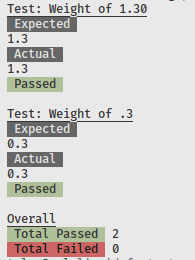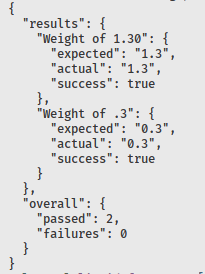Designed as a boilerplate to test snippets. Allowing you to define a test suite to test your snippet results.
How it works:
- Dynamically creates a page on the Shopify store called
liquid-fn-testwith a page template assigned to it - For each test case, a dynamically created page template with the snippet setup is included
- Store URL containing the dynamically created page is then fetched
- Fetched page content is compared against expected result
- Results are outputted to the terminal
- Cleanup of page templates
Because it runs on the Shopify store, any Liquid will be in the context of the shop including all variables (local, all_products, product, request, etc).
docker build -t liquid_fn . to build the image.
See Creating a test section for next steps.
npm install to install dependencies.
See Creating a test section for next steps.
Place your snippet into the tests directory.
Copy the tests/example.js file and rename it to the same as your snippet's name. For example: If your snippet is called monkey.liquid, then create a test file called monkey.js.
Modify the contents of the newly created test file to suit your testing needs.
If you would like to extend the setup or teardown methods with your own code, you can do so as such:
class Example {
// ...
async setup() {
await super.setup();
// your code
}
async teardown() {
await super.teardown();
// your code
}
// ...
}Three items are required for running a test:
- Publicly accessible store (not behind password)
- An access token with ability to
read_themesandwrite_themes - A theme's ID to modify assets
docker run -it -v .:/app:z liquid_fn node index.js -shop=(shop) -token=(token) -theme=(theme_id) -entry=(test_name) [-presenter=(presenter)]
Example: docker run -it -v .:/app:z liquid_fn node index.js -shop=someone.myshopify.com -token=89yurui389389ryiuriuu488 -theme=89389838 -entry=example.
node index.js -shop=(shop) -token=(token) -theme=(theme_id) -entry=(test_name) [-presenter=(presenter)]
Example: node index.js -shop=someone.myshopify.com -token=89yurui389389ryiuriuu488 -theme=89389838 -entry=example
Several events are executed during the test suite's run. You have the ability to tap into any of these events or even define your own. The example test shows how you can utilize the setup function to define events to listen for. Each event may pass in an object (details) to your listener.
on([event_name(s)], [handler])- Adds
[handler]to listen to the[event_name(s)].
- Adds
off([event_name(s)], [handler])- Removes
[handler]from[event_name(s)]
- Removes
once([event_name(s)], [handler])- Adds
[handler]to listen to the[event_name(s)], fired only once.
- Adds
emit([event_name], [details])- Fires event with a name of
[event_name]and passed[details]to handlers.
- Fires event with a name of
setup:start: Whensetupis called. Details:- None
setup:end: Whensetuphas ran successfully. Details:- Response from page creation
- Response from snippet creation
setup:failure: Whensetupfailed. Detail:- Error object
liquid-load:start: Attempt to load the snippet contents. Details:- File path of snippet, to attempt reading
liquid-load:end: When snippet was successfully read. Details:- File path of snippet
liquid-load:failure: When snippet failed to be read. Details:- Error object
teardown:start: Whenteardownis called. Details:- None
teardown:end: Whenteardownhas ran successfully. Details:- Responses from deleting page templates
teardown:failure: Whenteardownhas failed. Details:- Error object
render:start: Whenrenderis called. Details:- Liquid setup code
- Delay value
render:end: When rendering ran successfully. Details:- HTTP text response from render call
render:retry: When page fetch received HTML content, should be no HTML doctype due to no layout. Details:- None
render:retry:failure: When retry has also failed. Details:- None
render:suffix: Suffix generated for the dynamic page template. Details:- Suffix string
assert:start: Before an assertion is ran. Details:- Description of test
- Assertion logic
- Expected result
- Actual result
assert:success: After an assertion has ran successfully. Details:- Description of test
- Assertion logic
- Expected result
- Actual result
assert:failure: After an assertion has failed. Details:- Description of test
- Assertion logic
- Expected result
- Actual result
- Error object
See tests/example.liquid and tests/example.js.
Various methods of output presenters are supported; default is console with addition to json and json-pretty. Example output of both:
| Console | JSON |
|---|---|
 |
 |
Why NodeJS?
Previously attempted a similar setup with Ruby, since Shopify's Liquid library is a Ruby package (Gem).
While the implementation worked great, it had flaws of not being able to utilize Shopify data or Shopify's custom Liquid filters such as asset_url, img_tag, money, etc. which could lead to some snippets not producing a true rendered result to what it would on Shopify's servers.
Given the process to get a result of the snippet rendering, the tool really could've been developed in any language such as Go, or Python, etc. however, given majority of Shopify developers most likely know their way around Javascript, then it made sense to go down that path.
Why a new page for each test assertion?
Shopify now caches page content. So, by creating a new page for every test assertion, we can get around the issue of having a stale rendered output. Additionally, through previous research, where there was a single page template which got updated instead of newly created, the update to theme file would take a indeterminded amount of time to refresh on Shopify, thus giving us the issue again of stale reneded output.
Upon completion of the test suite, all created page templates on the theme are removed as part of cleanup.
- Add a
Filterservice to allow for modifying data before sent to Shopify